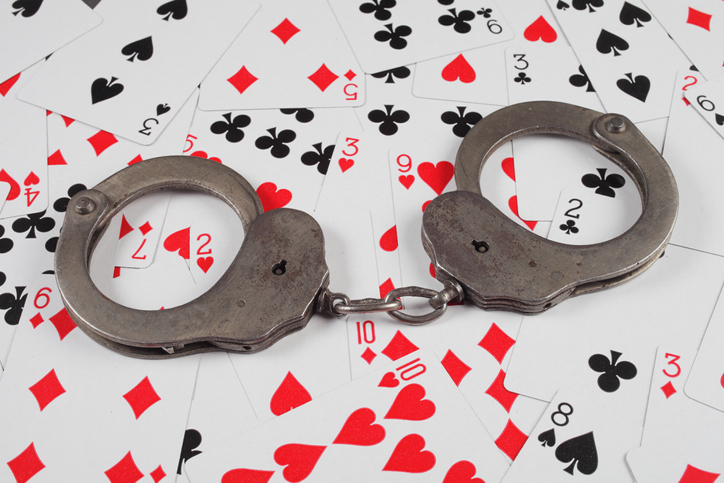Cheating while gambling in Las Vegas is certainly not a new concept. For as long as games have been around to play, players have been around looking for ways to beat the system and come out on top of the games. As technology continues to evolve, so do the intricate devices used to cheat while gambling.
NRS 456.0751 states that the possession of any device, software or hardware to obtain an advantage at playing a game is prohibited. The law bans individuals from possessing (with the intent to use) any computerized, electronic, electrical, or mechanical device, or any software or hardware, or any combination thereof, which is designed, constructed, altered, or programmed to obtain an advantage at playing any game in a licensed gaming establishment or any game that is offered by a licensee or affiliate.
This includes devices that:
Cheating with a gaming device is a serious crime in Nevada and carries with it the appropriate, negative consequences. NRS 463.01552 defines a gaming device as any object used remotely or directly in connection with gaming – or any game which affects the result of a wager by determining win or loss.
Some of these gaming devices include:

Further, NRS 465.0853 states that it is unlawful to manufacture, sell or distribute any cards, chips, dice, game or device which is intended to be used to violate Nevada law. It is also unlawful to possess, use, sell or manufacture any counterfeit instruments, counterfeit tickets or other counterfeit items used to determine the outcome of any contest or promotional activity conducted by or on behalf of any licensee.
When playing a gambling game or cashless wagering system, the game or system must be approved by the Nevada Gaming Control Board or by lawful coin of the United States of America. If an individual knowingly uses any other chips, tokens, wagering credits, or wagering instruments not approved, their actions are considered illegal.
The same law prohibits individuals (who are not duly authorized employees of the gaming system) from having on their person or in their possession on or off the premises of any licensed gaming establishment: any device intended to be used to violate the provisions of this chapter; any key or device known to have been designed for the purpose of and suitable for opening, entering or affecting the operation of any gambling game, cashless wagering system or dropbox; or any paraphernalia for manufacturing slugs.
As used in this subsection, “paraphernalia for manufacturing slugs” means the equipment, products and materials that are intended for use or designed for use in manufacturing, producing, fabricating, preparing, testing, analyzing, packaging, storing or concealing a counterfeit facsimile of the chips, tokens, debit instruments or other wagering instruments approved by the Nevada Gaming Control Board or a lawful coin of the United States, the use of which is unlawful pursuant to subsection 3. The term includes, but is not limited to:

So what happens if you’re found guilty of a violation of any of the above provisions? You will be found guilty of a category B felony and will be punished in prison for 1-6 years and/or fined up to $10,000. Also, an immigration judge could find that any of these crimes is reason enough for a non-U.S. citizen to be deported. Whether you are a citizen or a non-citizen, it’s important to speak to a trusted criminal defense lawyer to understand the specific charges and potential consequences against you if you are charged.
It’s also important to note that any person or persons who attempt or conspire to cheat these gaming laws will each be found guilty of a category B felony and punished accordingly, regardless of whether or not they personally played any gambling game or used any prohibited device. That means: even planning to cheat can land an individual in jail for 6 years.
There are common defenses used by criminal defense attorneys to help individuals who are being convicted of gaming fraud. The most common defense against cheating that is used is simply “I wasn’t cheating.” This defense aims to prove that no cheating occurred and that the defendant’s actions during the gambling game were entirely compliant with the rules of the game. If an experienced criminal defense attorney can prove that nothing illegal occurred, the case will be dropped.

Another defense used against cheating is that there was police misconduct. If the police or authorities perform an illegal search and seizure during their investigation of a cheating case, the criminal defense attorney can file a motion to suppress evidence. After that, the judge may grant the motion and disregard all the evidence that was illegally obtained and – oftentimes – the case may be dropped for lack of substantial proof of cheating.
If convicted of cheating at gambling in Las Vegas, an individual’s records can be sealed five years after the case is officially closed. That rule only applies if the person is found guilty. If they are not found guilty, or the case is dismissed, there is no waiting period to have the record sealed.
To learn more about the consequences and defenses involved in cheating with the use of a gambling device in Nevada, contact an experienced Las Vegas criminal defense attorney.